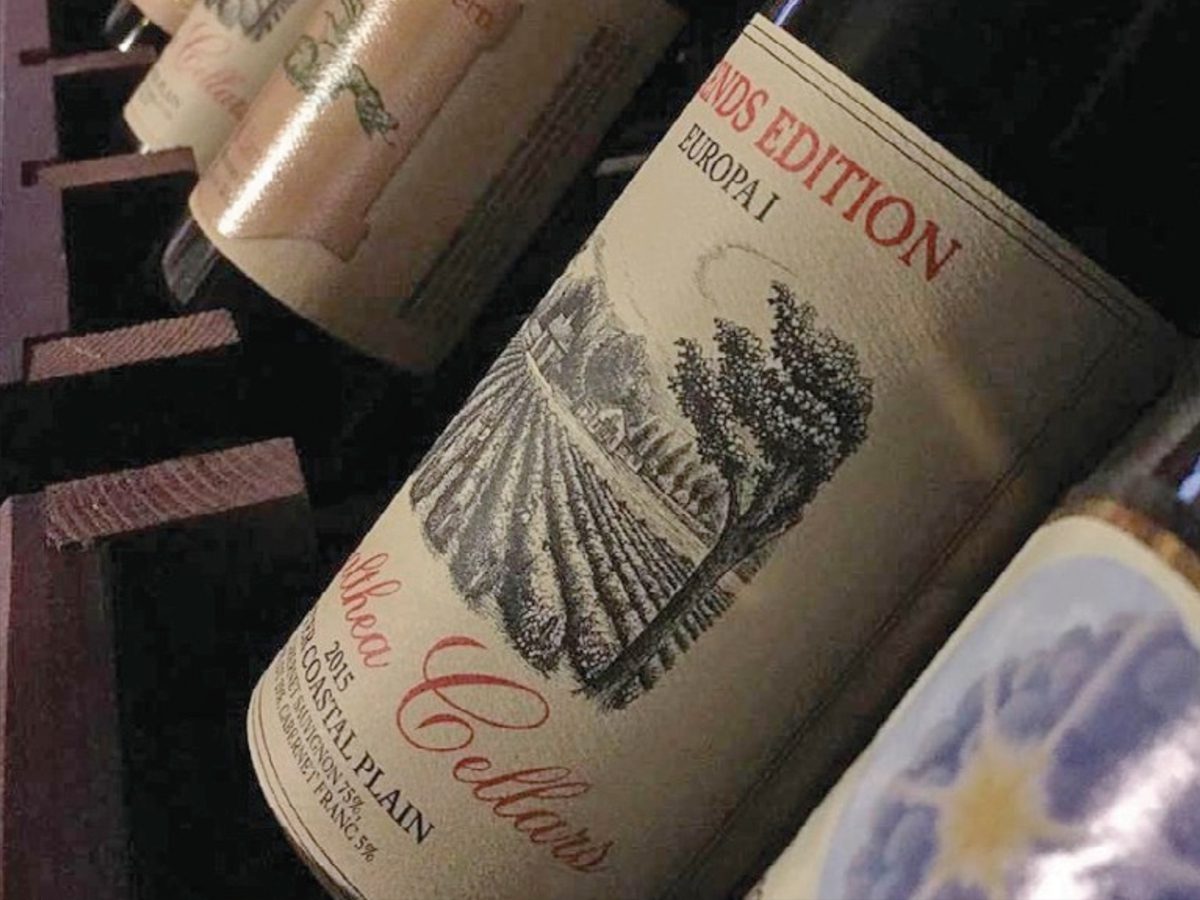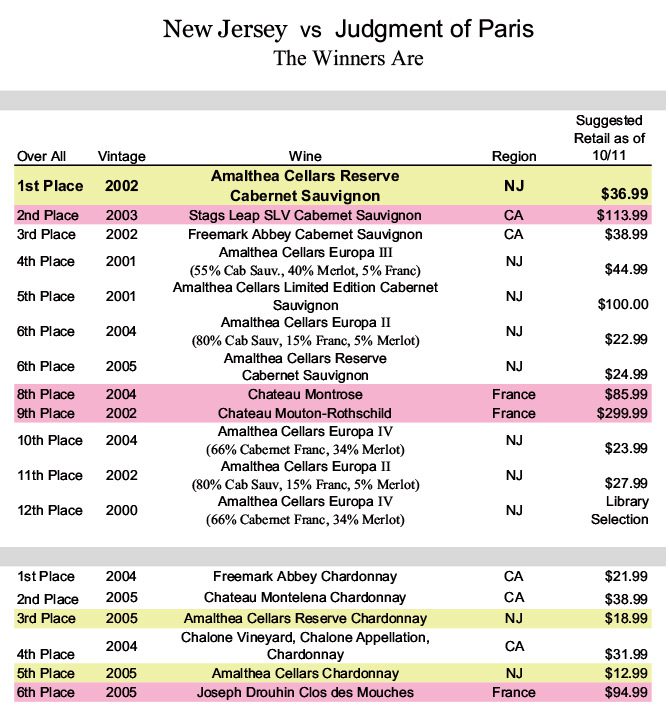Amalthea Cellars

Louis Caracciolo, founder of Amalthea Cellars, can pinpoint exactly when he realized his longtime dream of producing world-class wines in South Jersey could become a reality.

The first time Amalthea wines were judged superior
It was a spring day in 1976. He was toiling away on his farm in Atco – on hands and knees planting what would become Amalthea’s first vineyards – when he took a phone call from a college friend who excitedly told him about the “Judgment in Paris.”
That’s when, for the first time, wines from the Napa region in California overtook French vintages with best-in-class reputations in an official blind tasting. To say it was a major upset is to put it lightly. As far as Caracciolo was concerned, this news was life changing.
“This was not about Napa at all,” Caracciolo recalls. “It meant that the next region that could earn a reputation for producing the best wines could be anywhere in the world, including South Jersey. My mission was clear from that day forward. And it paid off. Year after year, Amalthea has been producing harvests that can compete with the finest wines anywhere.”
When it opened to the public in 1982 – just one year after the state relaxed Prohibition-era rules that restricted the industry for decades – Amalthea Cellars was just the 8th farm winery to gain a license. Today there are some 55 wineries statewide, and wine tourism is a big industry that enjoys strong support from the administration of Gov. Phil Murphy.
Still, Amalthea stands apart, having earned its reputation as one of the top wineries not only in South Jersey but worldwide by winning countless awards from state, national and international wine competitions. In 2007, Amalthea overturned both Napa Valley and French wines for the first time in 9 blind competitions. It was effectively a redo of the Judgement of Paris – with South Jersey emerging as the winner and Caracciolo’s dream realized.
Like most success stories, Amalthea’s rise to the top did not take place overnight. As Caracciolo tells it, 1976 was indeed a watershed moment. Even with his college degree in food science and brimming with wine-making ambitions, he was almost ready to give up the dream in the mid ’70s after numerous attempts to gain a commercial license had been rejected by the state. Not just that, the only New Jersey wines taken seriously at the time were made from sweeter grapes native to the area – Concords and Niagara. The barriers simply seemed too high. Then came the Judgment in Paris, and it was like the stars aligned.
The state’s decision to relax licensing rules coincided with breakthroughs in pest control, he says. “Although New Jersey’s weather is comparable to that of the winemaking regions in France, for centuries no one here on the East Coast could get the kinds of grapes found in places like the Bordeaux region in France to flourish – grapes like Cabernet Sauvignon, Merlot and Chardonnay,” he says. “Thomas Jefferson died trying to plant the grapes that produce the European greats. Then, by the late ’60s, there were finally pest-control products on the market that worked.”
Caracciolo had an advantage over other long-established growers. His grandfather, an immigrant from Naples, brought to South Jersey his knowledge and respect of the old-world ways of wine-making. “I learned how it was made in Italy for centuries, passed down through generations in a way you don’t often see in wineries anymore,” he says.
He also learned about the subtleties that have always made French wine exceptional, thanks to a stint as a consultant in the mid-80’s at Chateau Margaux, a centuries-old winery in the Bordeaux region of France.

The Garonne River wraps around Bordeaux like the Delaware River hugs South Jersey’s growing region, creating similar conditions for vineyards
During his stint in Bordeaux, Caracciolo realized the uncanny similarities between wine regions. Most striking was how the Garonne River wraps around Bordeaux just as the Delaware River hugs South Jersey vineyard towns.
“The Delaware River is the exact same configuration as the Garonne, only a mirror image,” he says. “It creates the same growing conditions.”
Though wineries are a growing part of the South Jersey community, Amalthea’s old-world ways and award-winning wines set it apart.
“By 2007 and 2008, with the help of wine icon George Taber, the TIME Magazine correspondent who was in the room for the Judgment of Paris, things started to heat up,” Caracciolo says. “At the Taber blind tastings in those years, Amalthea Cellars consistently overturned the finest wines from Napa and France. Ironically, we were beating wines that cost 10 to 20 times more than our prices.”
Amalthea Cellars is also a welcoming place where both connoisseurs and casual drinkers feel at home. Visitors to the Atco winery will find it to be as stunningly beautiful as France or Tuscany. The vineyards and rustic farm transport visitors to another time and place, evoking feelings from New Jersey’s rich rural history dating back to times when stagecoaches were traveling up and down the White Horse Pike.
But for those who are already well-versed in the experience of wine as an art (or those who have been converted by the experienced staff), Amalthea offers a truly unique product straight from the old country: Cantina Mas.
Cantina Mas is a dry red wine served straight from the barrel into a take-home tote bag. This allows wine lovers to enjoy fresh draft wine in their own homes, just like they would in the old country.
“Not only did Amalthea pioneer the first world-class wines in New Jersey, the fresh-draft wine that’s been in my family for generations is now wildly popular,” adds Caracciolo. “That’s incredibly gratifying.”
Valentine’s Day Wine Trail Weekend
Do something extraordinary this month during Amalthea Cellars’ Valentine’s Day Wine Trail Weekend. Held on Feb. 11 and 12, and then again Feb. 18 and 19, the 2-day events are a delightful celebration of all things wine, whether you’re a novice or wine connoisseur. In celebration of the 40th anniversary, founder Louis Caracciolo says he will allow guests to sample the 2022 vintage, which is not for sale.
“It’s very unusual for me to let people taste wine that raw,” he says. “It’s like tasting the tomato sauce from the pot while it’s still simmering. It’s not aged yet to go into bottles, but it will be good. And then, 2 to 3 years from now when the wine is aged, we will be celebrating the release of these wines again.”
Here’s what wine critics have said about Amalthea Cellars through the years.
“Since 1975, it has produced wines that speak for themselves. They have won countless awards and generated relationships with winemakers in the prestigious growing regions of France, Italy and California.”
Alfred De Martini, noted freelance writer/designer
“They said it couldn’t be done, but Lou Caracciolo didn’t believe them. The “they” are the oenophiles, wine connoisseurs who firmly believe that New Jersey could never produce a fine wine.”
Phyllis Stein-Novack, Courier Post
“He believes that any alteration of the grape juice is a step away from the natural process. He makes no compromises in his quest to make world-class wines. Jon Palmer, “Wineries of the Mid-Atlantic” “It’s supple, rich 1986 Cabernet – still maturing in the barrel – is excellent.”
Howard G. Goldberg New York Times wine writer.
209 Vineyard Road, Atco
856-768-8585
amaltheacellars.com
![]() @amaltheacellars
@amaltheacellars


 Do something extraordinary this month during Amalthea Cellars’ Valentine’s Day Wine Trail Weekend. Held on Feb. 11 and 12, and then again Feb. 18 and 19, the 2-day events are a delightful celebration of all things wine, whether you’re a novice or wine connoisseur. In celebration of the 40th anniversary, founder Louis Caracciolo says he will allow guests to sample the 2022 vintage, which is not for sale.
Do something extraordinary this month during Amalthea Cellars’ Valentine’s Day Wine Trail Weekend. Held on Feb. 11 and 12, and then again Feb. 18 and 19, the 2-day events are a delightful celebration of all things wine, whether you’re a novice or wine connoisseur. In celebration of the 40th anniversary, founder Louis Caracciolo says he will allow guests to sample the 2022 vintage, which is not for sale.

